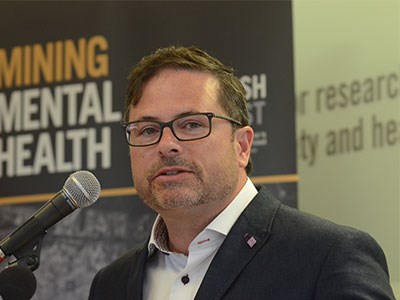A new research project at the Centre for Research in Occupational Safety and Health (CROSH) at Laurentian University will study the mental health of miners at Vale’s Sudbury operations.
Dubbed Mining Mental Health, the three-year, $400,000 study will be funded entirely by Vale, with voluntary participation from its workers, members of the Steelworkers Union (USW).
Jody Kuzenko, director of Vale’s Ontario Production Services and a CROSH board member, said of disability claims related to mental health from across the province, 78 per cent are short-term, while 67 per cent are long-term.
At Vale’s Ontario operations, one in four disability claims are attributable to mental health.
Despite those statistics, Kuzenko said there remains very little research done on predictors, facilitators and barriers to mental health in mining.
“The aim of the project is to develop key strategies that promote the best possible mental health for our workers, our employees, and our people at Vale’s Ontario operations,” Kuzenko said.
“In addition, the study will help others in the mining industry and similar sectors to develop evidence-based practices that effectively promote positive mental health.”
Researchers will survey a sample of workers from all occupational groups across Vale’s Ontario operations, which will be overseen by a multi-disciplinary research team from CROSH, led by Dr. Michel Larivière, a clinical psychologist and CROSH’s associate director.
Researchers will work closely with Vale’s occupational health committee through all phases of the study.
Larivière noted that one in five Canadians will suffer from mental illness in 2015, and 500,000 Canadians per week will miss work as a result, a cost to the economy of $50 billion per year. But more distressing is the accompanying human suffering, he said.
“Mining is a complex business that involves sophisticated equipment and technologies that are constantly being monitored that are constantly maintained — gauges are checked and instruments are calibrated daily,” Larivière said.
“Remarkably excluded from close monitoring — and this is not unique to mining — is the most complex of all our instruments and technologies: the human brain, and directly associated with this, human wellbeing.”
Larivière said the study is significant for two reasons: there isn’t any research of its kind in academic literature internationally, and there’s a high level of collaborative support from various stakeholders, including government, industry, labour and academia.
“Good will come of this,” he said. “Studying worker mental health was due, and our research team is grateful to all of you for giving us the capacity to do it.”
Ontario Labour Minister Kevin Flynn, who was on hand for the July 23 announcement in Sudbury, noted that mental health awareness has only recently cropped up in public awareness, and now employers, the labour movement, professional associations and government all have “catching up” to do in order to help erase the stigma associated with mental health.
“We wouldn’t feel bad about somebody that breaks their leg at work, but we would look down sometimes on someone who’s contracted PTSD (post-traumatic stress disorder),” Flynn said. “We think of them as soft. Or someone with depression, perhaps we think that was weak, and we know that simply isn’t true.”
Alluding to the Mining Health Safety and Prevention Review that was released earlier this year, Flynn said the success of that review — and the development of recommendations that will lead to greater safety for mine workers — was the result of collaboration amongst all stakeholders.
“We’re well on our way to implementing each and every one of those recommendations,” he said, suggesting he’s optimistic the CROSH study can serve the same function.




